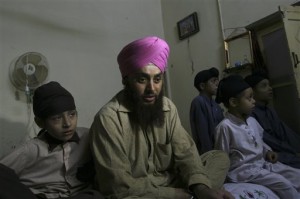Pakistan – Five Sihks Kidnapped – Oppression of Pakistan Minorities
— AP reports: “Five Sikh men who fled their hometown on the Afghan border were making a quick trip back home when masked men blocked their way with a pickup on a mountain road not far from the Khyber Pass. There were no houses, no buildings, no other cars in sight. The kidnappers covered their faces with black scarves and carried machine-guns.”
— “In a country beset by a powerful Islamist insurgency, where suicide bombings are commonplace and government offensives widely dismissed as ineffective, anyone can become a victim. But for the nation’s minorities — its small communities of Hindus, Christians and Sikhs — life is particularly precarious. Thousands have fled their villages, crowding into urban slums. Thousands more have fled the country.”
— “‘With the rise in militancy in our society in general, and in the northwest in particular, minorities are feeling more threatened,’ said I.A. Rehman, a senior official with Pakistan’s Human Rights Commission. He noted many Sikhs have been driven from their homes, and those who remain are now often forced to pay militants a ‘jizya’ — a traditional tax for non-Muslim.”

AP: "In this photo made on March 19, 2010, Surjeet Singh, from Pakistan's Sikh community, sits with family members after his release in Peshawar, Pakistan. Singh, who had been kidnapped for ransom by alleged militants, was freed after 42 days as a result of a crackdown operation by security forces" (AP Photo/Mohammad Sajjad)
— “Singh’s journey, which began on a cold morning in January and ended 42 days later with a March 1 bloody gunbattle, underscores the threats to those minorities, as well as the lawlessness of Pakistan’s frontier regions.”
— “Two months later, it’s still not clear exactly why the Sikhs were targeted: Were the bandits waiting for them? Would they have kidnapped anyone who came by? Certainly their religion made them easier targets, since it is more difficult for them to make use of the region’s informal power networks, the tribal and religious leaders who can protect people in the semiautonomous areas.”
— “On that day, though, as armed men swarmed toward their car, shouting for the five Sikh men to move quickly, all Singh and his friends were thinking about was survival.”
— “Two of them managed to slip away amid the chaos, but three — all sharing the same common Sikh surname, Singh — were quickly captured.”
— “‘They held us at gunpoint, immediately dragged us out of our car,’ said Surjeet Singh, a quiet composed man. He and his friends were blindfolded and driven for about an hour. Then they began walking.”
— “They could see nothing through their blindfolds. They could only feel cold pressing in as they climbed higher into the Hindu Kush mountains.”
— “After hours of walking, they were brought to a set of rooms carved into the mountainside. It would be their home for the next 42 days. There they would be kept chained and often blindfolded. Occasionally, they were beaten. The prisoners never saw their captors’ faces — which were always covered with scarves — and even now they do not know who they were.”
— “They clearly were militant Muslims, forcibly cutting their prisoners hair. Keeping hair uncut is a deeply important religious precept for Sikh men.”
